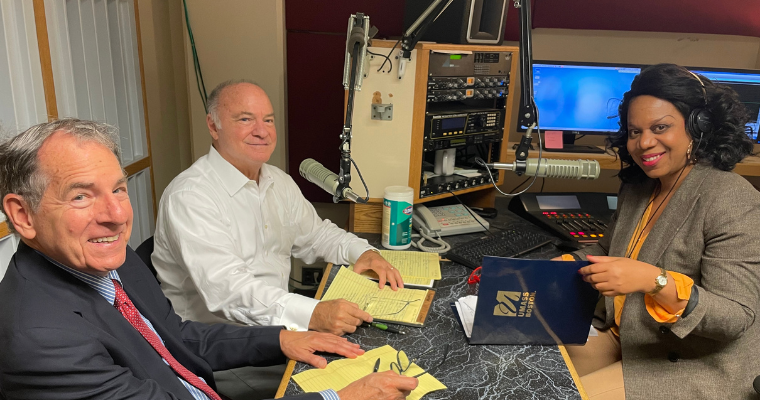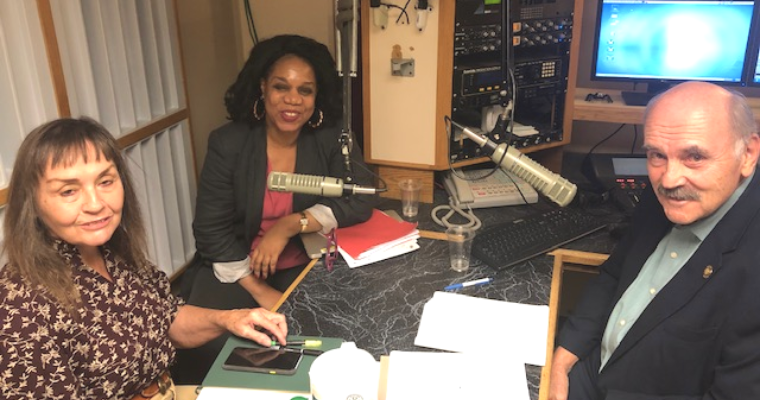- Home
- News
- Recent News
- McCormack Invites its Legacy Founders Ed Beard, St
McCormack Invites its Legacy Founders Ed Beard, Steve Crosby, and Ira Jackson to Talk about the School’s Impact
In 2023, the McCormack School turns 40 while continuing to build on its decades of scholarly and applied excellence in policy and public affairs. Founded in 1983 as the McCormack Institute of Public Affairs during an era when few public policy schools existed, the animating idea was to connect policy to practice, in service to more responsive, effective, and accountable government. Even as its priorities, programs, and people have changed, that core commitment remains unwavering.

To mark the occasion, last semester the School organized a series of year-long special “McCormack @ 40” events to reflect on the past, ponder the present, and prepare for the future. To kick things off, the School welcomed back McCormack Institute Founding Director Edmund Beard (1983–91, 1999–2003, and Acting Dean 2003–06); McCormack Graduate School Founding Dean Steve Crosby (2006–11), and Interim Dean Ira Jackson (2012–15). The trio joined McCormack in October and November for a series of two-hour hybrid “Founders” roundtable discussions and recorded interviews on McCormack’s inception, evolution, and implications for what lies ahead. This spring, the McCormack @ 40 series continues via discussions and interviews later airing on Season 2 of McCormack Speaks @UMB Radio, a public affairs series hosted by McCormack School Interim Dean Rita Kiki Edozie that launched last July in partnership with WUMB public radio and UMass Boston.
Founders I with Ed Beard: The first interactive event featured Ed Beard, taking place on October 28, 2022. Titled “Founders I: The Institute (1983),” the hybrid roundtable conversation was moderated by Dr. Marcy Murninghan, part-time Senior Advisor for Outreach and Engagement in the Dean’s Office. Murninghan has a long affiliation with McCormack, going back to its beginnings when she first met Beard. She began the roundtable segment by framing it as a story about “The Man, the Mission, and the Money,” asking Beard to reflect on both the circumstances and the special role he played in bringing McCormack into being in 1983.
“We cherry-picked the Masters of Science in Public Affairs program inherited from the old Boston State College,” Beard recalled, evoking a time when Massachusetts public higher education

was consolidating due to cost cutting. In 1982, the state closed Boston State College, merging it into UMass Boston. “Back then, traditional policy academics were not concerned with management and oversight. We saw the need to do something different and more immediately relevant.”
Beard went on to tell colorful backstories about the politics of securing both endowment and matching grant funding, along with other forms of institutional support, from Congress and the Massachusetts state legislature. What followed was an animated and appreciative discussion with both in-person and online participants.
Much of this spilled over into Beard’s radio chat with Murninghan and Dean Edozie. There he shared more about the trials and tribulations of first creating an academic vehicle to secure funding support for the 18 faculty members he oversaw as Chair of the Political Science Department. An entrepreneur at heart, at that time it was the early 1980s and Beard was the youngest acting chair in department history. He found himself confronting the mighty crisis of supply and demand with respect to money for faculty projects: for example, he had only $90 for travel funds and $40 in Xerox support for all 18 faculty members.
Upon reading about the launch of the Carl Albert Congressional Studies and Research Center at the University of Oklahoma with a $2 million federal grant—Carl Albert served as the 46th Speaker of the U.S. House of Representatives—Beard had an idea: Why not build something similar honoring John W. McCormack, a legendary public servant with deep Boston roots who had served as U.S. House Speaker from 1962 to 1970?
From there, things took off. In the early days, Beard was joined by the late great John Joseph Moakley, another son of Boston, who introduced the bill, named the John W. McCormack Endowment Act, on October 3, 1983. Provisions of that bill later were folded into H.R.2878, a larger bill introduced earlier by Moakley’s House colleague Rep. Paul M. Simon (D-Il) that eventually found its way back to the House via an August 1984 report from the House Committee on Education and Labor. The original McCormack Institute endowment request finally was authorized by both the House and Senate on October 17, 1984 and signed into law that same day by President Ronald Reagan as Public Law No. 48–480. With $3 million in endowment funding flowing to UMass Boston on or after October 1, 1984, the John W. McCormack Institute for Public Affairs was now a reality.
From the beginning, the vision of the McCormack Institute was to counterbalance the negligence displayed by Boston’s private higher ed institutions toward their host community. “Boston was, and remains, the hub of higher education in the U.S. and, indeed, the world,” Beard observed. “Those institutions thought that they had national and international responsibilities and clienteles … serving national and international constituencies. The result was that none of them were paying any attention to Boston.”
Because UMass Boston’s primary student body comprises recent graduates of Boston and eastern Massachusetts public schools, Beard envisioned a McCormack Institute that studied and served Boston. “We were going to be a public policy research center with large associated public service and public education features focused in particular on issues of concern to Boston, to Massachusetts, and to New England,” he said in the radio interview. “There was a need, and we began to fill it—fast.”
He then acknowledged the many early practitioners who had a hand in the Institute’s development, including Joseph Slavet, Padraig O’Malley, Raymond Torto, and Betty Taymor. Ultimately, the conversation among Beard, Murninghan, and Edozie revealed how the McCormack Institute evolved to build an interdisciplinary action research model, one that served as the pedagogic foundation for the McCormack Graduate School. “It is hard to get interdisciplinary programs to continue,” Beard said, “[but] the kind of thing that we did in the Institute, and the kind of thing that PhD program in Public Policy still does now, of bringing people into a core entity from different home departments…works, as long as…you’ve got enough resources and stature. And I think several of [McCormack’s] programs do. It’s just so much fun and so motivational, so much more satisfying and lucrative, to be in that new thing that it’ll hold them together if there’s enough glue.”
Founders II with Steve Crosby and Ira Jackson: A week after Ed Beard shared stories about McCormack’s earliest days, on November 4 interim Dean Edozie hosted two other legacy leaders, former McCormack Deans Steve Crosby and Ira Jackson. The program, titled “Founders II: The School (2003),” again featured an interactive roundtable with faculty and students followed by a radio interview for the McCormack Speaks series.

Steve Crosby served as the official Founding Dean of the McCormack Graduate School from 2006 until 2012. Under his leadership, McCormack developed the Edward J. Collins Jr. Center for Public Management, with Crosby securing an $8 million grant—one of the largest in UMass Boston’s history. Ira Jackson succeeded Crosby, serving as Dean of the McCormack School from 2013 to 2015 and later as Vice Provost at UMass Boston from 2015 to 2017. Together with Program Director George Bachrach, Jackson and Crosby also are co-founders of the Civic Action Project, which provides public policy fellowships to graduate students across Boston.
The conversation among Crosby, Jackson, and Edozie expanded on the previous week’s discussion of the McCormack Institute, highlighting, too, public affairs teaching, research, and service affecting local, national, and global policy issues. Commenting in their radio broadcast conversation on the transition from “the McCormack Institute” to “the McCormack Graduate School,” as it is known today, Founding Dean Steve Crosby acknowledged the excellent foundation he inherited from Edmund Beard, saying “The McCormack Graduate School was not [started] from nothing. There were the master’s program, the PhD program, the gerontology program, centers and institutes—it was an influential body already, but it needed to be organized into a school, and that I like a lot: being able to focus on the initial organizational structure.”
Most exciting to Crosby was the fact that he could have a hands-on approach, relatively speaking, in shaping anew the culture of the school—though that did not come without challenges. Among them: having limited physical space to grow on the UMass Boston campus and not possessing a solid background in academe. Nonetheless, Crosby was able to achieve several milestones at McCormack. These include creating several centers and hiring faculty members who helped steward the McCormack School through its expansion into what it is today.
During his tenure as interim Dean, Ira Jackson is recognized as having brought the McCormack School into greater contact with other parts of UMass Boston, especially the School for the Environment, the College of Liberal Arts, and the Honors College. Jackson’s time at McCormack was driven by, he recalled, “the process of intellectual stimulation on campus to think big. How can we cut our teeth and make a signature contribution on some issue, [ranging] from early education to climate change? We came up with some big ideas.”
Those efforts included embracing more interdisciplinary work across the campus, dipping into undergraduate students at the Honors College and the College of Liberal Arts to increase graduate enrollments by creating dual degree programs, and the creation of the Sustainable Solutions Lab. As Jackson put it, “I just helped to catalyze some developments which I thought would assist in accelerating McCormack’s pace of progress.”
The former and current Deans all agree that McCormack is at a particularly opportune moment to capitalize on the long and prosperous path that earlier leaders Edmund Beard, Steve Crosby, and Ira Jackson forged, and that interim Dean Edozie continues to direct. As Jackson exclaimed, “If you could imagine three issues that you’d want to be on the cutting edge of, it would be racial injustice/DEI, climate change, and gerontology—McCormack’s all over all three, with world class scholarship. It’s just a question of applying that in a way that attracts investment, comes to scale, and continues to make a contribution.”